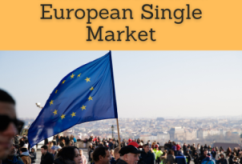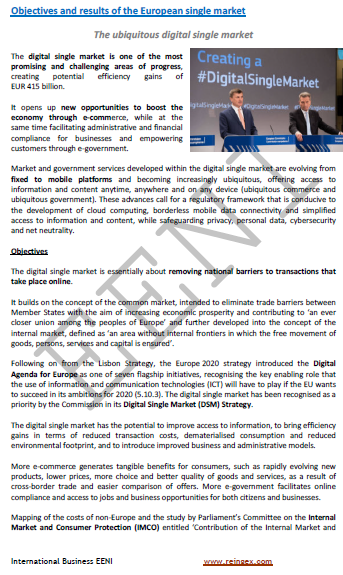European Digital Single Market, EU

EU Strategy for the creation of the European Single Market
- European Union Electronic Commerce Directive
- European Union's strategy for the European Digital Single Market creation
- Digital Agenda for Europe
- The two pillars of the digital single market: a free and open e-market
- Facilitating the on-line access to services and products across the EU
- National barriers removal to the online operations
The objectives of the subject “European Digital Single Market (EU)” are the following:
- To know the EU Electronic Commerce Directive
- To understand the concept of the European Digital Single Market (EU)
- To analyze the advantages for the EU, countries, companies and citizens
- To evaluate the objectives and results of the European Single Market

The Subject “European Digital Single Market (EU)” belongs to the following Online Programs taught by EENI Global Business School:
Doctorate: European Business, World Trade.
Masters: International Business, Foreign Trade.

Languages:  or
or  Mercado Digital
Mercado Digital  Marché unique numérique de l’UE
Marché unique numérique de l’UE  Mercado único digital.
Mercado único digital.
Masters adapted for  EU Students.
EU Students.
Sample - European Digital Single Market (EU):

In 2015 the European Commission published the EU Strategy for the European Digital Market creation, based on two pillars: a safe and free market.
This European digital single market should:
- Facilitate the online access to the services and products across the EU
- Optimizing the digital services and infrastructures in the EU
- Promote the EU digital economy
In addition to relaunching the European Economy.
The European digital single market will expand the EU and member countries digital economy (€ 415 billion when implemented): Austria, Belgium, Bulgaria, Croatia, Cyprus, Czech Republic, Denmark, France, Estonia, Finland, Germany, Greece, Hungary, Ireland, Italy, Latvia, Lithuania, Luxembourg, Malta, Netherlands, Poland, Portugal, Romania, Slovakia, Slovenia, Spain and Sweden.
The EU estimates that only...
- 15% of Europeans buy online products from other countries of the EU
- 7% of SMEs export products online to the other European Countries
The main problems detected in developing the European Single Market are the:
- European Markets Fragmentation
- Regulatory Technical Barriers to Trade
European Economic Area (Europe, Western Civilization).
(c) EENI Global Business School (1995-2024)
We do not use cookies
Top of this page



